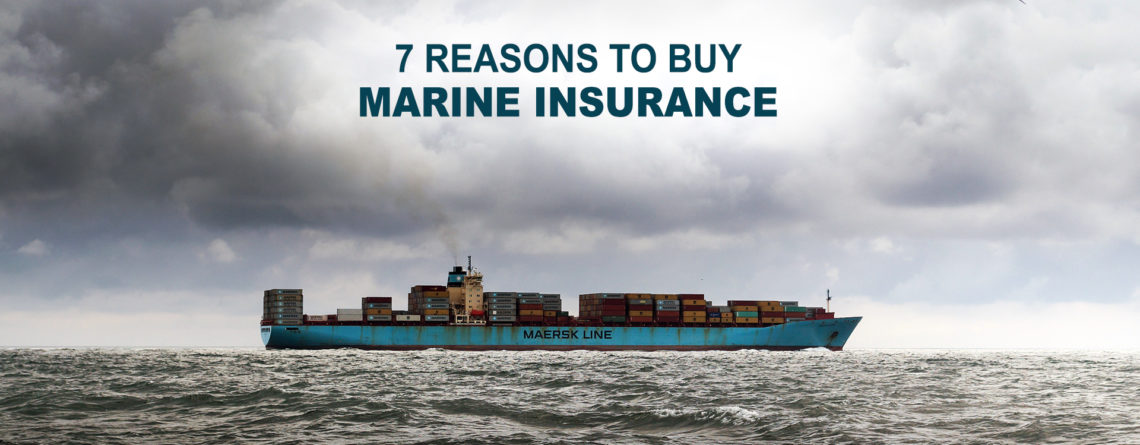7 Reasons to Buy Marine Insurance
Disasters can strike anywhere
In this highly evolving world where technology is taking over everything, transport still remains a risky business. Choosing a reliable logistics service provider, an appropriate transport packaging, as well as buy marine insurance could be just the right step towards avoiding such risks.
Theft, storms, crushed containers, ships sinking, losing a container at sea, etc are some of the most common damages. Besides piracy, with today’s technology, identity theft is one of the most common elements of cargo theft. Fictitious pickups are increasing day-by-day. Though there are many ways you can prevent cargo theft, the best way would be to ensure your cargo. Remember, cargo theft can happen even with the most careful shippers.
If you buy your marine insurance under Institute cargo clauses A, your goods will be covered against all risks except for those explicitly excluded.
Losses may be big
While you can send your freight without any insurance, you would have to bear the entire financial cost in the case of damage or loss of your shipment. Legal recourse against the carrier can be a lengthy and complicated process, and international law strictly limits carrier liability. Depending on the choice of the insurer, you may insure your goods up to a certain amount above their invoice value and in case of loss, you will be indemnified according to its rate. The cargo insurance covers the purchase invoice value as well as part of the duties and taxes, as well as additional delivery costs.
Carriers limit their liability
There is an age-old phrase ‘you broke it you bought it’. But it does not apply to ocean carriers. Moreover, it doesn’t apply to air carriers, LTL carriers, or even some truckload freight to one degree or another. It is often cents on the dollar even when there is carrier liability.
The Carriage of Goods by Sea Act (COGSA) limits the carrier to a $500USD limit per package, if not package per shipping unit, as carrier liability. This often translates to $500USD per container even if there is carrier negligence. In some cases you can argue the point your bill of lading states 20 pallets of ‘parts’ and that one pallet is the package. Although keep in mind ocean carriers have spent years arguing this point and they are very good at it. Even if you win the argument after thousands of dollars of legal fees, using our $100,000USD insured value used in reason number (04.) and the 20 pallets example used in this paragraph, you have just spent thousands in legal fees to collect 10% ($500USD Per Pallet) of the value of your freight lost.
Faster handling of the claims
Compared to liability claims, settling marine insurance claims is faster. Liability claims usually need a comprehensive investigation if the cause of damage is not clear or is extensive. In some cases, the carrier might make objections that might delay the process even further. For instance, they can claim that the consignor or consignee’s actions contributed to the loss. This would mean more expenses on your part as you try to prove that you deserve compensation.
Transfer of the coverage from a seller to a buyer
Instead of the party who purchased it, the marine insurance “follows” the goods. If you are the seller and purchase marine insurance, your client will benefit from it after the risk passes to him in accordance with your arrangements.
In this regard, one must note that the seller’s obligation under CIF terms is to purchase insurance with minimal coverage i.e. Institute cargo clauses C for listed risks. In case you are buying your goods under CIF terms, we advise you to always request from your seller a purchase of marine insurance policy for all risk- Institute cargo clauses A.
Marine insurers cover costs from the general average
General average refers to the equal sharing of losses resulting from sacrificing part of the cargo or ship to save the whole in an emergency. For instance, if a fire occurs and it is put out in a manner that damages some cargo with water, you will end up in an instance of the general average. The same will happen if cargo is jettisoned to free a grounded vessel. Marine insurance covers all such costs.
Annual or single trip cover
Purchasing marine insurance is different from purchasing regular insurance. You do not have to buy it annually. If the cover is only required for a one-off trip, one doesn’t need to purchase an annual marine cargo policy. The specific transit insurance policy offers cover for a single trip. Cover ceases to apply as soon as the cargo arrives at its destination. This policy is ideal for business owners who send out cargo items once in a while. Thus, a business can opt for a single trip policy which means you will only get the coverage required and only when it is needed.
Now that you have read the article, you won’t regret paying a little extra for your marine insurance and what better place than PTIC India to get it. We have been an established and trusted name in the insurance industry. Call us today and talk to an agent to get reliable marine insurance coverage.











